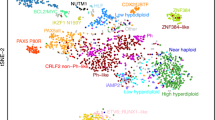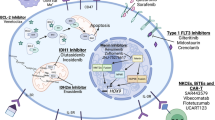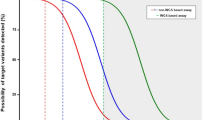Abstract
Purpose
The advent of tyrosine kinase inhibitor (TKI) therapies has revolutionized the treatment of chronic myeloid leukemia (CML). The European LeukemiaNet (ELN) recommends quantification of BCR–ABL1 transcripts by real-time quantitative PCR every 3 months during TKI treatment. Since a proportion of patients in deep molecular response (DMR: MR4, MR4.5, MR5) maintain remission after treatment stop, assessment of DMR is crucial. However, systematically collected molecular data, monitored with sensitive standardized assays, are not available outside clinical trials.
Methods
Data were collected on the standardized assessment of molecular response in the context of real-life practice. BCR–ABL1 transcript levels after > 2 years of TKI therapy were evaluated for DMR by local laboratories as well as standardized EUTOS laboratories. Since standardized molecular monitoring is a prerequisite for treatment discontinuation, central surveillance of the performance of the participating laboratories was carried out.
Results
Between 2014 and 2017, 3377 peripheral blood samples from 1117 CML patients were shipped to 11 standardized reference laboratories in six European countries. BCR–ABL1 transcript types were b3a2 (41.63%), b2a2 (29.99%), b2a2/b3a2 (3.58%) and atypical (0.54%). For 23.72% of the patients, the initial transcript type had not been reported. Response levels (EUTOS laboratory) were: no MMR, n = 197 (6.51%); MMR, n = 496 (16.40%); MR4, n = 685 (22.64%); MR4.5, n = 937 (30.98%); MR5, n = 710 (23.47%). With a Cohen’s kappa coefficient of 0.708, a substantial agreement between EUTOS-certified and local laboratories was shown.
Conclusions
Multicenter DMR assessment is feasible in the context of real-life clinical practice in Europe. Information on the BCR–ABL1 transcript type at diagnosis is crucial to accurately monitor patients’ molecular response during or after TKI therapy.

Similar content being viewed by others
References
Baccarani M et al (2013) European LeukemiaNet recommendations for the management of chronic myeloid leukemia. Blood 122:872–884. https://doi.org/10.1182/blood-2013-05-501569
Baccarani M, Castagnetti F, Gugliotta G, Rosti G (2015) A review of the European LeukemiaNet recommendations for the management of CML. Ann Hematol 94(Suppl 2):S141–S147. https://doi.org/10.1007/s00277-015-2322-2
Branford S et al (2006) Rationale for the recommendations for harmonizing current methodology for detecting BCR-ABL transcripts in patients with chronic myeloid leukaemia. Leukemia 20:1925–1930. https://doi.org/10.1038/sj.leu.2404388
Branford S et al (2008) Desirable performance characteristics for BCR-ABL measurement on an international reporting scale to allow consistent interpretation of individual patient response and comparison of response rates between clinical trials. Blood 112:3330–3338. https://doi.org/10.1182/blood-2008-04-150680
Cross NC, White HE, Muller MC, Saglio G, Hochhaus A (2012) Standardized definitions of molecular response in chronic myeloid leukemia. Leukemia 26:2172–2175. https://doi.org/10.1038/leu.2012.104
Cross NC, Hochhaus A, Muller MC (2015a) Molecular monitoring of chronic myeloid leukemia: principles and interlaboratory standardization. Ann Hematol 94(Suppl 2):S219–S225. https://doi.org/10.1007/s00277-015-2315-1
Cross NC et al (2015b) Laboratory recommendations for scoring deep molecular responses following treatment for chronic myeloid leukemia. Leukemia 29:999–1003. https://doi.org/10.1038/leu.2015.29
Cross NC et al (2016) Development and evaluation of a secondary reference panel for BCR-ABL1 quantification on the International Scale. Leukemia 30:1844–1852. https://doi.org/10.1038/leu.2016.90
Cross NCP et al (2018) Consensus on BCR-ABL1 reporting in chronic myeloid leukaemia in the UK. Br J Haematol 182:777–788. https://doi.org/10.1111/bjh.15542
Foroni L et al (2011) Guidelines for the measurement of BCR-ABL1 transcripts in chronic myeloid leukaemia. Br J Haematol 153:179–190. https://doi.org/10.1111/j.1365-2141.2011.08603.x
Gabert J et al (2003) Standardization and quality control studies of ‘real-time’ quantitative reverse transcriptase polymerase chain reaction of fusion gene transcripts for residual disease detection in leukemia—a Europe Against Cancer program. Leukemia 17:2318–2357. https://doi.org/10.1038/sj.leu.2403135
Gambacorti-Passerini C et al (2011) Multicenter independent assessment of outcomes in chronic myeloid leukemia patients treated with imatinib. J Natl Cancer Inst 103:553–561. https://doi.org/10.1093/jnci/djr060
Hehlmann R et al (2014) Deep molecular response is reached by the majority of patients treated with imatinib, predicts survival, and is achieved more quickly by optimized high-dose imatinib: results from the randomized CML-study IV. J Clin Oncol 32:415–423. https://doi.org/10.1200/jco.2013.49.9020
Hochhaus A et al (2009) Six-year follow-up of patients receiving imatinib for the first-line treatment of chronic myeloid leukemia. Leukemia 23:1054–1061. https://doi.org/10.1038/leu.2009.38
Hochhaus A et al (2017) Long-term outcomes of imatinib treatment for chronic myeloid leukemia. N Engl J Med 376:917–927. https://doi.org/10.1056/NEJMoa1609324
Huang X, Cortes J, Kantarjian H (2012) Estimations of the increasing prevalence and plateau prevalence of chronic myeloid leukemia in the era of tyrosine kinase inhibitor therapy. Cancer 118:3123–3127. https://doi.org/10.1002/cncr.26679
Hughes TP et al (2003) Frequency of major molecular responses to imatinib or interferon alfa plus cytarabine in newly diagnosed chronic myeloid leukemia. New Engl J Med 349:1423–1432. https://doi.org/10.1056/NEJMoa030513
Hughes T et al (2006) Monitoring CML patients responding to treatment with tyrosine kinase inhibitors: review and recommendations for harmonizing current methodology for detecting BCR-ABL transcripts and kinase domain mutations and for expressing results. Blood 108:28–37. https://doi.org/10.1182/blood-2006-01-0092
Jabbour E et al (2014) Early response with dasatinib or imatinib in chronic myeloid leukemia: 3-year follow-up from a randomized phase 3 trial (DASISION). Blood 123:494–500. https://doi.org/10.1182/blood-2013-06-511592
Kalmanti L et al (2015) Safety and efficacy of imatinib in CML over a period of 10 years: data from the randomized CML-study IV. Leukemia 29:1123–1132. https://doi.org/10.1038/leu.2015.36
Kantarjian H et al (2010) Dasatinib versus imatinib in newly diagnosed chronic-phase chronic myeloid leukemia. New Engl J Med 362:2260–2270. https://doi.org/10.1056/NEJMoa1002315
Kantarjian HM et al (2011) Nilotinib versus imatinib for the treatment of patients with newly diagnosed chronic phase, Philadelphia chromosome-positive, chronic myeloid leukaemia: 24-month minimum follow-up of the phase 3 randomised ENESTnd trial. Lancet Oncol 12:841–851. https://doi.org/10.1016/s1470-2045(11)70201-7
Landis JR, Koch GG (1977) The measurement of observer agreement for categorical data. Biometrics 33:159–174
Mahon FX (2016) Discontinuation of TKI therapy and ‘functional’ cure for CML best practice research. Clin Haematol 29:308–313. https://doi.org/10.1016/j.beha.2016.10.014
Mahon FX et al (2010) Discontinuation of imatinib in patients with chronic myeloid leukaemia who have maintained complete molecular remission for at least 2 years: the prospective, multicentre Stop Imatinib (STIM) trial. Lancet Oncol 11:1029–1035. https://doi.org/10.1016/s1470-2045(10)70233-3
Muller MC et al (2009) Harmonization of molecular monitoring of CML therapy in Europe. Leukemia 23:1957–1963. https://doi.org/10.1038/leu.2009.168
Ross DM et al (2013) Safety and efficacy of imatinib cessation for CML patients with stable undetectable minimal residual disease: results from the TWISTER study. Blood 122:515–522. https://doi.org/10.1182/blood-2013-02-483750
Saglio G et al (2010) Nilotinib versus imatinib for newly diagnosed chronic myeloid leukemia. N Engl J Med 362:2251–2259. https://doi.org/10.1056/NEJMoa0912614
Saussele S, Richter J, Hochhaus A, Mahon FX (2016) The concept of treatment-free remission in chronic myeloid leukemia. Leukemia 30:1638–1647. https://doi.org/10.1038/leu.2016.115
Saussele S et al (2018) Discontinuation of tyrosine kinase inhibitor therapy in chronic myeloid leukaemia (EURO-SKI): a prespecified interim analysis of a prospective, multicentre, non-randomised, trial. Lancet Oncol 19:747–757. https://doi.org/10.1016/s1470-2045(18)30192-x
White H et al (2015) A certified plasmid reference material for the standardisation of BCR-ABL1 mRNA quantification by real-time quantitative PCR. Leukemia 29:369–376. https://doi.org/10.1038/leu.2014.217
Funding
This study was funded by Novartis Oncology within the European Treatment and Outcome Study (EUTOS).
Author information
Authors and Affiliations
Corresponding author
Ethics declarations
Conflict of interest
All the authors declare that they have no conflict of interest.
Ethical approval
All the procedures performed in studies involving human participants were in accordance with the ethical standards of the institutional and/or national research committee and with the 1964 Helsinki Declaration and its later amendments or comparable ethical standards. The study has been approved by the ethics committee of the Jena University Hospital, Jena, Germany (No. 3944-12/12).
Informed consent
Informed consent was obtained from all individual participants included in the study.
Additional information
Publisher's Note
Springer Nature remains neutral with regard to jurisdictional claims in published maps and institutional affiliations.
Rights and permissions
About this article
Cite this article
Möbius, S., Schenk, T., Himsel, D. et al. Results of the European survey on the assessment of deep molecular response in chronic phase CML patients during tyrosine kinase inhibitor therapy (EUREKA registry). J Cancer Res Clin Oncol 145, 1645–1650 (2019). https://doi.org/10.1007/s00432-019-02910-6
Received:
Accepted:
Published:
Issue Date:
DOI: https://doi.org/10.1007/s00432-019-02910-6




